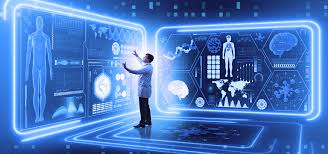AI in Healthcare
Applications of AI in Healthcare, Benefits of AI in Healthcare, Challenges of AI in Healthcare
Artificial intelligence (AI) is rapidly transforming the healthcare industry, offering innovative solutions to complex challenges. From diagnosing diseases to personalizing treatment plans, AI is playing a pivotal role in improving patient care.
The Future of Healthcare: How AI is Transforming the Medical Field
AI in Healthcare
AI in Healthcare
Applications of AI in Healthcare
Artificial intelligence (AI) is rapidly transforming the healthcare industry, offering innovative solutions to complex challenges. From diagnosing diseases to personalizing treatment plans, AI is playing a pivotal role in improving patient care. Here are some key applications of AI in healthcare:
- Disease Diagnosis: AI algorithms can analyze medical images (X-rays, MRIs, etc.) to detect abnormalities and assist in early diagnosis. They can also process patient data to identify patterns and predict disease risk.
- Drug Discovery: AI is accelerating drug discovery by analyzing vast datasets of chemical compounds and identifying potential drug candidates. This can significantly reduce the time and cost of developing new medications.
- Personalized Treatment: AI algorithms can tailor treatment plans to individual patients based on their unique genetic makeup, medical history, and lifestyle. This personalized approach can improve treatment outcomes and reduce side effects.
- Robotic Surgery: AI-powered robotic systems are assisting surgeons in performing complex procedures with greater precision and minimal invasiveness. These robots can improve surgical outcomes and shorten recovery times.
- Virtual Assistants: AI-powered chatbots and virtual assistants can provide patients with information, schedule appointments, and remind them of medication dosages. This enhances patient engagement and accessibility to healthcare services.
Benefits of AI in Healthcare
The integration of AI into healthcare brings numerous benefits, including:
- Improved Accuracy and Efficiency: AI algorithms can analyze data with greater speed and accuracy than human doctors, leading to faster and more reliable diagnoses.
- Enhanced Patient Care: Personalized treatment plans and early disease detection can improve patient outcomes and overall quality of life.
- Reduced Costs: AI can streamline healthcare processes and reduce administrative burdens, leading to lower healthcare costs.
- Increased Accessibility: AI-powered tools can extend healthcare services to remote areas and underserved populations.
- New Discoveries and Innovations: AI is driving advancements in drug discovery, medical imaging, and other areas of healthcare research.
Challenges of AI in Healthcare
Despite its potential, AI in healthcare also presents several challenges:
- Data Privacy and Security: AI algorithms rely on vast amounts of patient data, raising concerns about privacy and data security. Strict regulations and robust security measures are essential to protect sensitive information.
- Bias and Fairness: AI algorithms can perpetuate existing biases in healthcare data, leading to unfair or inaccurate outcomes for certain patient groups. It's crucial to address these biases and ensure fair and equitable access to AI-powered healthcare services.
- Transparency and Explainability: Understanding how AI algorithms make decisions is essential for building trust and accountability. Efforts are underway to develop more transparent and explainable AI models.
- Ethical Considerations: As AI becomes more integrated into healthcare, ethical questions arise regarding its use in decision-making, patient autonomy, and the potential for job displacement.
Summary
- AI is rapidly transforming healthcare by enhancing diagnosis, treatment, drug discovery, and patient care.
- AI brings numerous benefits, including improved accuracy, efficiency, personalized care, reduced costs, and increased accessibility.
- Challenges include data privacy, bias, transparency, and ethical considerations, which need to be addressed to ensure responsible and equitable use of AI in healthcare.
